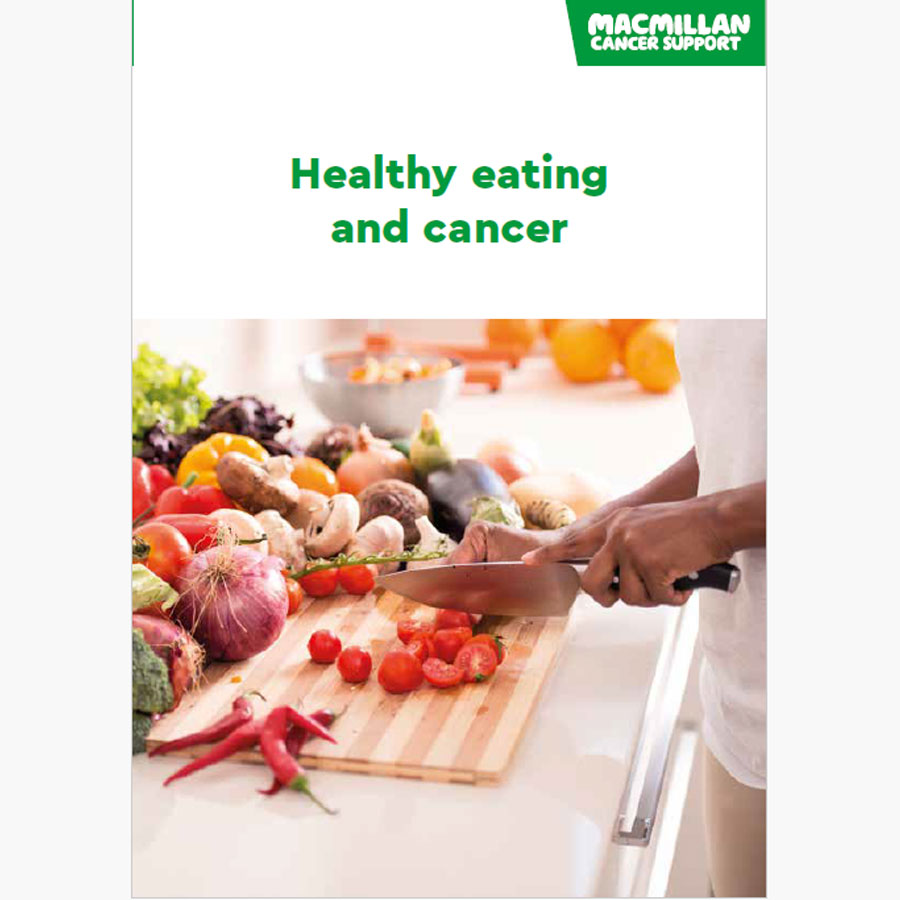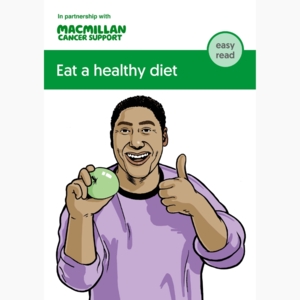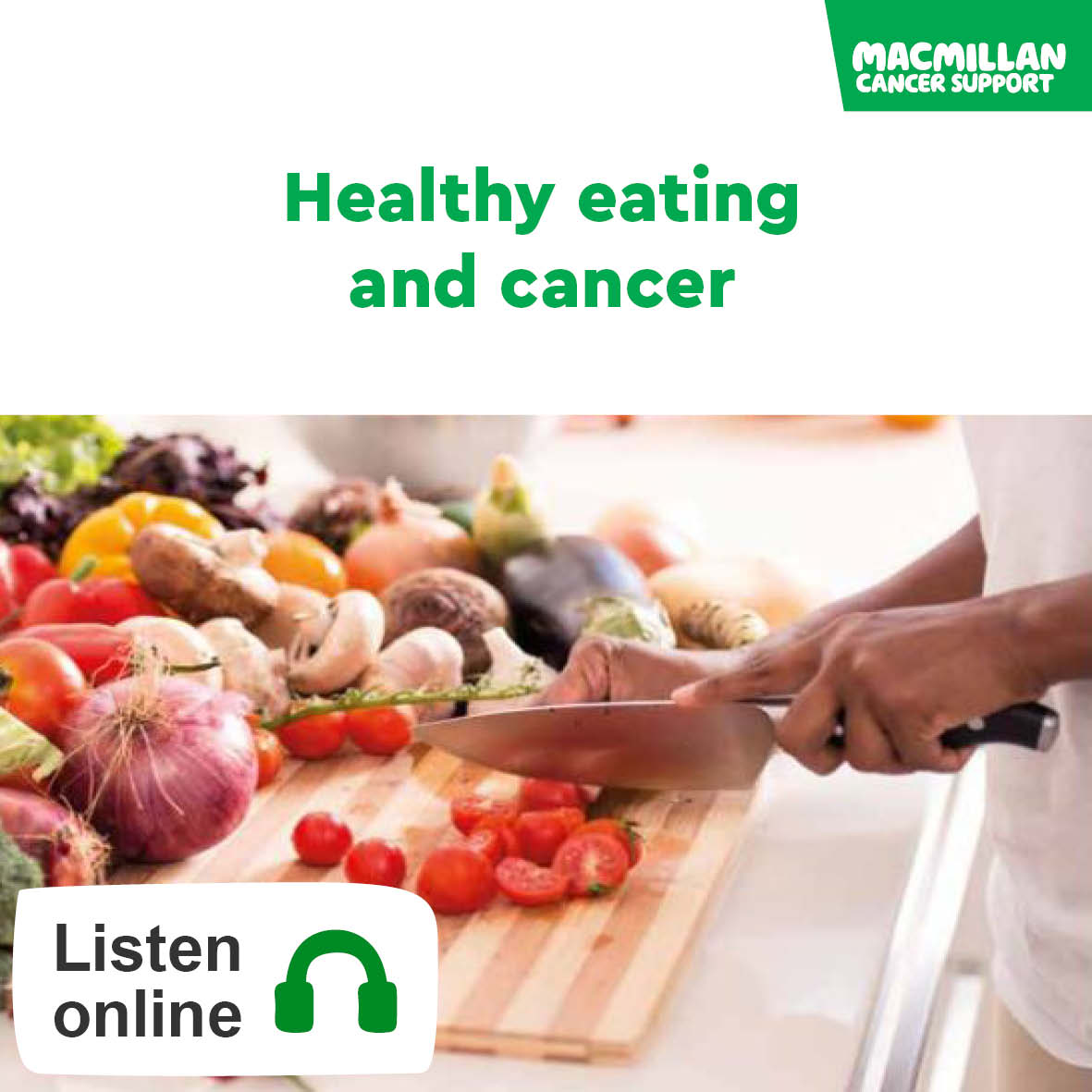What is a healthy, balanced diet?
A healthy, balanced diet contains a variety of foods, in the right amounts. This will give you enough energy, protein, vitamins and minerals to stay healthy.
What makes up a healthy, balanced diet?
Food has nutrients that our bodies need to work well. The main groups of nutrients are:
- carbohydrates
- proteins
- vitamins and minerals
- fats
- fibre
- fluids.
A healthy, balanced diet contains a variety of foods, in the right amounts. This will give you enough energy, protein, vitamins and minerals to stay healthy and keep your body working well.
A healthy balanced diet for each day includes the following:
- You should eat at least 5 portions of fruit and vegetables. These should make up more than a third (over 33%) of the food you eat each day.
- You should aim to have plenty of carbohydrate-rich foods, such as bread, rice, pasta, noodles, couscous and potatoes. These should also make up over a third (over 33%) of what you eat each day.
The remainder of your daily diet should include the following:
- You should have some protein-rich foods, such as lean meat, poultry, fish, eggs, nuts, beans and lentils, tofu or soya products. The amount of protein you eat should be a smaller portion than the fruit, vegetables and carbohydrates you eat. You should have 2 to 3 servings of protein each day.
- You should have some milk and dairy foods such as cheese and yoghurt or dairy alternatives. The amount of diary you have should be a smaller portion than the protein. You should aim to have 2 to 3 portions per day.
- You should aim to have a very small amount of oils and spreads.
- You should try to drink plenty of fluid. Aim to drink 6 to 8 glasses a day. This is about 2 litres (3½ pints).
What foods should I try to limit?
Limit foods that are high in fat and sugar. This is because they often do not have any additional vitamins or minerals. High-fat or sugary foods give you a large amount of energy, but they can cause weight gain.
Try to drink water or unsweetened squashes that contain no added sugar. You can also drink tea and coffee (without sugar).
Try to reduce the amount of processed and red meat you eat. This includes sausages, bacon, cured meats and reformed meat products. Limit red meat to 1 or 2 portions per week.
You should also avoid foods which have a lot of salt.
You do not need to get the balance right with every meal. But try to include all of the food groups over a day, or even a week.
This chart shows the amount of each food group you should try to eat for a healthy, balanced diet.
Food groups pie chart
The NHS also has an Eatwell guide and useful tools to help you move more, eat well and be healthier. You can download them as free apps using your mobile phone or tablet.
Booklets and resources
Healthy eating and different cultural diets
If you are looking for culturally specific information about healthy eating, you may find these guides useful:
- South Asian Eatwell guide – tailored advice for traditional South Asian diets, including vegetarian options.
- African and Caribbean Eatwell guide – culturally relevant tips for balanced eating using familiar ingredients.
- Vegetarian Eatwell – guidance for those following a meat-free diet.
- Vegan Eatwell – tips for maintaining nutrition without animal products.
You can also ask to your doctor or dietician for dietary advice or any other culturally specific diet resources that may be available.
Understanding food labels
Food labels can help you make healthier choices when food shopping. The law says that almost all food packaging over 10cm² must include information about the nutritional value of the food inside the package.
The labels give information about what the food contains, including:
- fats
- salt
- sugars
- calories.
The labels may also give information about sodium and fibre.
Any ingredient that can commonly cause an allergic reaction is written in bold. If you have a less common food allergy this may not be in bold, so you need to read the label carefully.
Many food manufacturers and supermarkets use a food traffic light system on their labels. The system tells you the amount of fats, saturated fats, sugars and salt in 100g (3½ oz) of the product. It is called a traffic light system because it uses the same colours as a traffic light.
The traffic light system
- Red – this means the level is high.
- Amber – this means the level is medium.
- Green – this means the level is low.
You should eat more foods with amber and green labels and fewer with red.
If a product does not have traffic light labelling, you can use the diagram below to check by comparing it with the list of ingredients.
Food labelling diagram
Know your food types
Not many of us check the energy (calorie) content of everything we eat. But knowing more about the different types of food can help you make healthier choices. It can also help you manage your weight.
Fruit and vegetables
Fruit and vegetables are a good source of vitamins, minerals and fibre. They are also usually low in fat. Most of us do not eat enough fruit and vegetables. You need to aim to eat at least 5 portions a day. A portion of fresh, frozen or canned fruit or vegetables is 80 grams. Fruit and vegetables should make up about a third (33%) of the food you eat every day.
Different types and colours of fruit and vegetables contain different nutrients. Try to eat a wide variety (or rainbow) of fruit and vegetables of different colours.
Eating the recommended amount of fruit and vegetables may lower the risk of heart disease. It may also reduce the risk of some types of cancer, such as cancers of the mouth, throat and lung.
Potatoes and sweet potatoes are not part of the fruit and vegetables group. They do not count towards your 5 a day. They are part of the carbohydrate group.
Carbohydrates (starchy foods)
Carbohydrates are an important part of a healthy diet. They are a good source of energy and contain nutrients including fibre, calcium, iron and B vitamins.
Starchy food should make up just over a third (33%) of what you eat each day. Starchy foods include, bread, breakfast cereals, potatoes, sweet potatoes, yams and cassava, rice, pasta, couscous and noodles.
Carbohydrates are broken down in the body into glucose. Glucose is a type of sugar that gives us energy. Energy is measured in calories. We all need a certain number of calories each day for energy, even if we are not being very active. For example, you need energy to breathe even when you are sitting down.
The amount of energy you need varies each day. It depends on how quickly your body uses the energy, and on how active you are. An adult man needs about 2,500 calories a day. An adult woman needs about 2,000 calories a day. If you eat and drink more calories than you use, you can gain weight. If you have fewer calories than you need, you use up your body’s energy stores and lose weight.
The NHS website has more information about daily calories.
As we get older our bodies need fewer calories. Eating smaller portions can help prevent weight gain.
Fibre
Fibre helps to keep the digestive system and bowel healthy, and prevent constipation. It is also called roughage. Fibre is the part of cereals, fruits and vegetables which passes through your gut (small intestine) but is not digested.
Many studies show that foods high in fibre may reduce the risk of bowel cancer. Most people do not eat enough foods that are high in fibre. Some carbohydrates can be a good source of fibre. Increasing the amount of fibre in your diet can help you feel full more quickly and for longer. This means you are less likely to eat more than you need.
The fibre in foods such as oats, beans and lentils may also help reduce the amount of cholesterol in the blood.
Protein
Protein is needed to build and repair muscles and other body tissues. When we are ill, injured or stressed, we need extra protein and energy to repair any damage.
Protein-rich foods can also be a good source of vitamins and minerals. Try to increase the amount of protein you have from plant-based sources. There is protein in red meat, poultry, such as chicken and turkey, fish, dairy products, such as milk and yoghurts, eggs, pulses, such as peas, beans and lentils, soya, tofu and mycoprotein (Quorn™), quinoa, nuts and seeds.
Meat
Several studies suggest that eating lots of red or processed meat can increase the risk of bowel cancer. Red meat includes, beef, pork, lamb, and veal.
Processed meats include, sausages, bacon, salami, tinned meats, packet meats, for example sandwich ham.
The greatest risk is when you eat 2 or more portions of red or processed meat a day. People who eat less than 2 portions a week seem to have the lowest risk. There has been no link found between eating poultry and developing cancer. Poultry includes chicken, turkey and duck.
Eating meat that is cooked at high temperatures, such as fried or barbecued meat, may also increase the risk of developing some cancers.
Fish
Fish is a good source of protein, vitamins and minerals. It is often low in saturated fat. Aim to have at least 2 portions of fish a week. Try to have:
- 1 portion of white fish, such as haddock, cod or plaice
- 1 portion of oily fish, such as sardines, salmon or mackerel.
Shellfish, such as prawns and mussels, are low in fat. They are also a source of minerals such as selenium and zinc.
Eggs
Eggs are a good source of protein and can be included in a healthy balanced diet. They contain dietary cholesterol. But this does not increase the cholesterol levels in your blood. Try to poach, boil or dry-fry eggs, rather than using oil or butter.
Plant-based sources of protein
Plant-based sources of protein are often healthier than meat or dairy. They also contain fibre, vitamins and minerals. And they can contain fewer calories than meat and dairy foods.
Pulses and nuts
Pulses such as beans, lentils and nuts are a good source of protein. Pulses can be used in lots of meals, such as stews or soups.
Nuts are high in energy and can be used in both sweet and savoury dishes. They contain good amounts of protein and some healthier, unsaturated fats.
If you are trying to lose weight, you should limit your portion sizes of nuts. This is because they are high in fat and contain a lot of calories.
Other plant-based protein
Soya is a good source of protein and is available in different products. These include soya mince, soya burgers and sausages, soya milk and tofu.
Mycoprotein (Quorn™) can also replace mince, burgers and sausages as a source of protein.
There have been some concerns about soya and its effect on breast cancer. There is currently no evidence to suggest that a moderate amount of soya in your diet is harmful.
Recommendations say it is safe to have whole soya foods. These are unprocessed soya foods, such as:
- miso
- tempeh
- tofu
- soya beans (edamame)
- soya nuts
- soya milk.
Choose soya milks with a lower sugar content by checking the nutrition information on food labels. Check that soya drinks are fortified with calcium.
If you have questions about soya, talk to your doctor, dietitian or specialist nurse.
Milk and other dairy products
Milk and dairy products are also good sources of protein, vitamins and calcium.
It can be good to include whole milk and dairy products in a building-up diet if you need to gain weight. If you are trying to maintain a healthy weight or lose weight, try semi-skimmed or skimmed cow’s milk, soya milk and fat-free yoghurt.
Cheese is high in saturated fat, especially hard cheeses like parmesan and cheddar. Eating too much can increase your cholesterol and risk of heart disease. Try to choose low-fat cheeses such as cottage or ricotta, and eat other cheeses less often. A portion of cheese is about the size of a small matchbox.
Dairy-free alternatives
Dairy-free milk alternatives include food products and ‘milk’ made from non-dairy products. It may also be called plant-based. Dairy-free milk alternatives include:
- soya
- rice
- oat
- almond
- hazelnut
- coconut.
If you have plant-based milk, check that it has added calcium and vitamins. Organic milk alternatives may not have any calcium and vitamins added. They also do not contain any protein, except for soya milk. Almond and hazelnut milk also has a small amount of protein.
Vegan cheese is often made from soya, but may be made from nuts and seeds and include oils such as coconut oil. There are a lot of different vegan cheeses available. It is important to check the packet to see what they are made of.
Sugar
Sugar gives us energy. Eating a lot of sugary foods, or foods with added sugar, can make you more likely to gain weight and develop other health problems.
There are different types of sugar:
-
Natural sugars
Some foods and drinks have natural sugars in them. These include fruit, vegetables and milk. Foods that contain natural sugars usually also contain vitamins and minerals.
The body also gets natural sugars when carbohydrate-rich foods, such as breads, potatoes, rice, and pasta, are broken down into glucose as part of the digestion process.
It is better to get energy from natural sugar from fruits, milk and starchy carbohydrates than from foods with added sugar. When these sugars are broken down to glucose, they are released more slowly than processed sugar. This helps to keep your energy levels more balanced.
-
Added (processed) sugar
Added or processed sugar is sugar that is added to processed foods and drinks. This includes white or brown sugar that you add to foods at home. These are sometimes called free sugars. Some free sugars are also found naturally in honey, syrups, and some fruit juices. Fizzy drinks and alcohol often contain a lot of added sugar.
Try to avoid food and drinks with added sugar. Processed sugars are not usually recommended if you want to maintain a healthy weight.
If you find it hard to reduce your sugar intake, a sweetener might help in the short term. But this will not reduce your craving for sugar, so it is not a long-term solution.
Fats
Having some fat in our diet helps us to absorb vitamins A, D, E and K. Foods that are high in fat are also high in energy (calories). Eating a lot of fat, or the wrong type of fat, can make you more likely to gain weight and develop other health problems.
There are 2 types of fat - saturated and unsaturated. It is important to try to eat less fat, and to choose foods that contain unsaturated instead of saturated fats. Unsaturated fats are still high-energy (high-calorie) foods.
Even foods labelled as low-fat can still be high in calories. But if you are trying to gain weight, you may need foods with a higher fat content in your diet.
-
Saturated fats
Saturated fat can raise cholesterol levels in the blood and increase the risk of heart disease. Foods high in saturated fat include:
- cheese, especially hard cheeses such as cheddar or parmesan
- butter, ghee and lard
- palm oil and coconut oil
- meat products, such as burgers and sausages
- biscuits, pastries and cakes
- some savoury snacks, like cheese crackers and crisps
- milk chocolate.
It is easy to eat too much saturated fat without realising. The current advice is that:
- men should eat no more than 30g of saturated fat a day
- women should eat no more than 20g of saturated fat a day.
You can use the nutrition labels on foods as a guide. High-fat foods contain more than 20g of fat per 100g. Low-fat foods contain less than 3g of fat per 100g.
-
Unsaturated fats
Unsaturated fats are a healthier option. Choosing unsaturated fat instead of saturated fat may help to reduce the risk of high cholesterol levels in the blood. There are 2 types of unsaturated fats - monounsaturated fats and polyunsaturated fats.
Monounsaturated fats are found in:
- olive oil and spreads
- rapeseed oil and spreads
- avocados
- some nuts, such as almonds, Brazil nuts and peanuts.
Polyunsaturated fats include omega-3 and omega-6s. Omega-3 fats are found in oily fish, whether it is tinned or fresh, such as:
- kippers
- mackerel
- salmon
- trout
- sardines.
A healthy, balanced diet should include 2 portions of fish a week. This should include 1 portion of oily fish. Eating 1 to 2 portions of fish a week helps reduce the risk of developing heart disease. But too much oily fish may not be good for you. This is because it can contain low levels of pollutants that can build up in the body.
You can get more information about how much white or oily fish you should eat on the NHS Eat Well website.
Omega-6 fats are found in vegetable oils, such as rapeseed, corn, safflower, soybean and sunflower oils, and in some nuts. Most of us get enough omega-6 in our diet.
Salt
Too much salt in your diet can lead to high blood pressure. This can cause heart disease and strokes. A diet that is high in salt can also increase the risk of developing stomach cancer.
Try to have no more than 6g of salt (1 teaspoon) a day. This includes the salt you add to your food, and the salt already in food. Foods containing high levels of salt include:
- many cured or processed foods – such as sausages, cured ham or bacon
- tinned foods
- ready meals
- cheese
- soy sauce.
You can find out how much salt is in processed food by checking the label. If there is more than 1.5g of salt per 100g, the food is high in salt. Low-salt foods contain 0.3g or less of salt per 100g.
Low-salt alternatives are not recommended as these can be high in potassium. Try to gradually reduce your salt intake instead.
Vitamins and minerals
The body needs minerals to help keep our nerves, bones and teeth healthy. Vitamins are essential to keep our bodies working. Different vitamins have different functions. These include:
- vitamin C, which keeps our skin and bones healthy
- vitamin K, which helps wounds to heal.
We need only very small amounts of vitamins and minerals. If you are eating a healthy balanced diet with plenty of fruit and vegetables, you are probably getting enough vitamins.
But if you cannot eat well for a long time, you may need vitamin and mineral supplements. Your doctor, dietitian or pharmacist can give you more advice about these.
High-dose vitamin and mineral supplements are not recommended during cancer treatment. This is because they might affect how your treatment works.
Fluids
Your body needs fluid to work properly. You should aim to drink at least 2 litres (31/2 pints) of fluids each day. You will need to drink more if you are:
- more active than normal
- somewhere hot (either indoors or outdoors)
- losing extra fluid, such as through sweat or diarrhoea.
Plain water is the best fluid to keep your body hydrated. It contains no calories and no sugars. If you do not like the taste, you could add a slice of lemon or lime, or some mint leaves. Some flavoured water drinks contain a lot of sugar and calories, so check the label first.
Milk is a good source of calcium, which is good for bone health. It also contains other vitamins and minerals. It is healthier to drink semi-skimmed or skimmed milk as these contain less fat and calories than whole milk.
Fruit and vegetable juices and smoothies contain a variety of nutrients, but they also contain sugar and calories. Aim to have no more than 1 small glass a day.
Juice drinks, squashes and fizzy drinks can be high in sugar and calories. They contain very few nutrients, so you should avoid drinking them where possible.
You can include tea and coffee when you are adding up how much you drink each day. But try to have other fluids that do not contain caffeine as well.
Sometimes when you think you are hungry, you may actually be thirsty. Before having a snack, try having a drink and waiting for 10 minutes. This can help you eat less.
Booklets and resources
About our information
This information has been written, revised and edited by Macmillan Cancer Support’s Cancer Information Development team. It has been reviewed by expert medical and health professionals and people living with cancer.
-
References
Below is a sample of the sources used in our information about healthy eating and cancer. If you would like more information about the sources we use, please contact us at informationproductionteam@macmillan.org.uk
The Eatwell guide. NHS. Available from www.nhs.uk/live-well/eat-well/food-guidelines-and-food-labels/the-eatwell-guide [accessed July 2025].
World Cancer Research Fund. Cancer risk factors. Available from www.wcrf.org/diet-activity-and-cancer/risk-factors [accessed July 2025].
British Dietetic Association website www.bda.uk.com [accessed July 20235].
Eat well, spend less. British Dietetic Association. Available from www.bda.uk.com/resource/food-facts-eat-well-spend-less.html [accessed July 2025].
Date reviewed

Our cancer information meets the PIF TICK quality mark.
This means it is easy to use, up-to-date and based on the latest evidence. Learn more about how we produce our information.
The language we use
We want everyone affected by cancer to feel our information is written for them.
We want our information to be as clear as possible. To do this, we try to:
- use plain English
- explain medical words
- use short sentences
- use illustrations to explain text
- structure the information clearly
- make sure important points are clear.
We use gender-inclusive language and talk to our readers as ‘you’ so that everyone feels included. Where clinically necessary we use the terms ‘men’ and ‘women’ or ‘male’ and ‘female’. For example, we do so when talking about parts of the body or mentioning statistics or research about who is affected.
You can read more about how we produce our information here.








